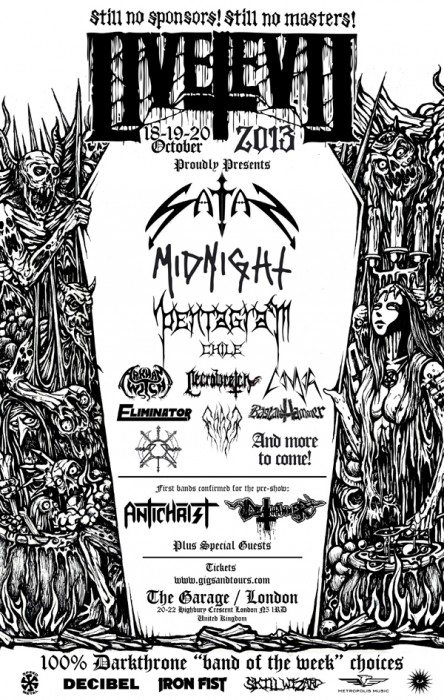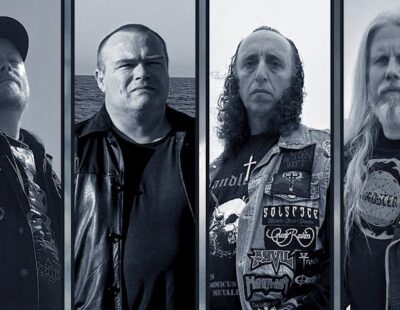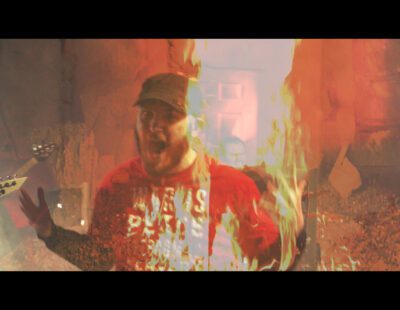According to their Facebook page, UK doom/Heavy Metal quartet Arkham Witch‘s personal interests include, “Ales, Histories, Wars, Invocations and Audible assaults. Drinking as fuck!” And their description of their sound is pretty much bang on too. “Old School Heavy Metal/Doom infused with Lovecraftian horror, tales of mighty Barbarians and festering evil superstitions!” What’s not to like there?
Featuring alumni of on-hold UK doom legends The Lamp of Thoth, Arkham Witch are a throwback to classic 70s hard rock, NWOBHM, and rough-cut early doom a la Vitus and co. This week the Deciblog caught up with the band’s founder, Simon Iff? (that’s probably not his real name, but a Crowleyian detective is exactly the sort of character who should front a band like Arkham Witch), and asked him about Lovecraft, The Lamp, and playing this year’s Live Evil Festival.
How did Arkham Witch get together?
Simon: We were just writing a shed load of songs and it was just really a side project to deal with the amount of songs we had, to find a way to record them and to put them out. The first demo that we recorded, in 2009, was well-received. We’re still selling copies of it today, which is brilliant for a £200 demo, so we decided to make it a full-time band. In Keighley, where we come from, we’ve got a lot of friends that we’ve been in bands with from years before, so it was easy just to go to them and ask them, “Do you want to play guitar? do you want to play bass?” And get the band up and running as a live band.
Could you put Arkham Witch and The Lamp of Thoth into context, musically? What would you do with The Lamp that you wouldn’t do with Arkham Witch?
Simon: That’s a good question, because when I came up with The Lamp of Thoth, when it was just me on my own, recording demos with my trusty drum machine, the idea I had in mind was a band like Trouble; you’ve got the doomy riffs, but that sort of metallic edge, that sledgehammer riff where they could take it up a notch if they wanted to. And I am thinking of the first two albums, the brilliant sound on those two albums. But a lot of the songs that I was writing were also really influenced by St. Vitus, which is a completely different sort of approach where it is sort of stripped down and slow punk, a bit messy, and the songs were [going] from one extreme to another. So when Randy Reaper joined, he had such a distinctive guitar sound, based on Dave Chandler of St. Vitus’, so certain songs worked and certain songs didn’t. The more metallic ones ended up being Arkham Witch songs, and the more doomy, laid-back slower ones were what The Lamp of Thoth did. We weren’t Reverend Bizarre slow, but the vibe of the band was more St. Vitus where Arkham Witch is more New Wave of British Heavy Metal with the doom element in it. The doom element was more to the fore in The Lamp of Thoth, driven by Randy Reaper’s guitar sound.
What has become of The Lamp? I heard you had a lot of material just waiting to be recorded.
Simon: One of the big problems with The Lamp of Thoth was we just had loads of material. Haha! Organising and recording it was a problem. It is the age old problem that affects most bands in the underground scene, where, to all intents and purposes, what you are doing is an expensive hobby, and everyone’s got a job. It’s time and money that restrict what you do. But when Arkham Witch took off a bit, Randy started playing with Solstice, and Solstice were one of his all-time favorite bands, and basically we just haven’t got around to doing anything else yet. We headed off in different directions and at the moment I can’t afford to be in two bands or spend the time rehearsing two bands, so we’ve just been doing the Arkham Witch thing.
So The Lamp is just really on-hold then?
Simon: I always intended to start it up again and record some new stuff; it’s just getting it together and organising it . . . But I am hoping that in the future I can come back to it because there is a lot of stuff that I have got recorded, demo-wise, that I would love to do with that band and that guitar sound.
It’s a good problem to have, though, surely: At least the ideas are there so you can bring the band back.
Simon: Well I hope so. That has always been the plan.
The demand has always been there. Does that surprise you?
Simon: Yeah, it does. It’s a nice surprise. I can’t listen to that album without listening to all the faults on it and the things I would do differently, but that was the first time we had been in a proper studio, and making that album was a proper experience because we recorded it in Germany. But it’s the same thing . . . I am fans of bands’ other albums and it’s what you see in it; when I hear it I just hear the mistakes, the out of tune vocals or whatever. People seemed to really like it, though, which is something I am really grateful for.
You’re always going to listen to your work differently from how we the audience do.
Simon: A good example for me is like St. Vitus. On stuff like “Clear Windowpane”, where the drums seem to go out of time but you love it because it’s so raw, unusual, and I hope that is what people see in The Lamp of Thoth, because it was our first album and in that session we recorded 17 songs which, looking back, was a bit ambitious, but we managed to come out of it with an album that people liked so . . .
With Arkham Witch, you have loads of catchy, hooky bits. Where did you get those influences from?
Simon: I think that comes from when I was a kid and I didn’t have much music. I had two cassettes of The Beatles; it was the Rock ‘n’ Roll Music album, Volume One, and the Rock ‘n’ Roll Music album, Volume Two. I listened to them relentlessly, and I think it’s that coupled with the St. Vitus vibe, the way that I write the songs (verse/chorus/verse/chorus/middle) is not like a Black Sabbath song where they don’t really have a chorus, but it’s kind of how I’ve always subconsciously structured the song. Plus, I’ve always had that love of NWOBHM, doom, rock and metal in general. It’s just the way that my songs come out, and if you look at the songs that I write, for some reason they all reach about six minutes. It’s amazing how many songs we have that are six minutes long. It’s some sort of subconscious pattern that are stuck in my head.
Does it surprise you how doom has evolved?
Simon: Well it’s the age old question: What is doom? Because the bands who originated this style weren’t consciously setting out to invent a genre that was all slow and all heavy and mournful. I mean a band like Pagan Altar, I don’t think they came out and set out to be doom. But then I think it is more about the underlying spirit of the music rather than the arrangements or tempo. I mean, a band like Pentagram are not slow, but they have that eerie vibe, and that’s what I look for in a doom band. I don’t just look for a band that’s really slow and mournful. I think I might have done in the 90s when I was younger, bands like Cathedral and the slower stuff from St. Vitus, but that kind of music, like any kind of music, any kind of metal, it got taken to the extreme, and I think what’s happened in the past is that they’ve taken it in all these new directions, sludge and death-doom etc, and now I think there’s nowhere for anyone to go. People can pick and choose the style that they love.
Nowhere to go in terms of extremes, but no matter the genre, good songwriting is rewarded. There can still be originality so long as the personality shines through and the songs are strong enough.
Simon: Yeah, but I think it’s the underlying spirit of the music; some songs are just DOOM. It’s actually amazing how up-tempo St. Vitus are as a doom band. I once figured out a cover of “Mystic Lady” and I thought I’d try and do something a bit different with it; so I played it as a sort of punk song, but when I listened to the original it wasn’t that much faster. With music, with regards to tempo, it can be like time-travel; a song like Reverend Bizzare’s “Cirith Ungol”, which is 21 minutes long? It doesn’t feel like that when you are listening to it because of the way it’s arranged. I think you are right: the songwriting and the structure is the most important thing.
Tell us a bit about Keighley. It has got a lot of doom history, has it not?
Simon: Well, The Lamp of Thoth, the idea for the band started when I discovered a local legend of a secret society that operated in Keighley in the late 19th century, who were so popular that the Golden Dawn and the Rosicrucians felt threatened by them, so they publicly denounced them as black magicians. They probably weren’t, but the idea of that, and knowing the town I come from . . . It’s a small town, they are proud of their heritage, of being a small town, and there’s an element of that hardness of an insular community. It just seemed natural that, of course, this secret society indulged in black magic because they are from Keighley, and they probably would do that. Living near the moor, near all the old pagan monoliths, it just seeps into your subconscious, no matter what genre of music you are into. There is just something about living in this part of the world.
And reading about the secret societies probably just confirmed your suspicions that there was some clandestine force, some society pulling the strings.
Simon: Yeah, some underground forces or society. I don’t know if you know, but Wurthering Heights, that was written near Keighley, and that has a lot of violent subconscious drive in it. Maybe it is the landscape, but it’s that sort of connection with Arkham Witch and the town of Arkham; we read about the town of Arkham in H.P. Lovecraft and have sort of identified with that, knowing what Keighley’s like, y’know!
You’re playing Live Evil in October. What do you make of the other bands on the bill?
Simon: When we looked at the bill, yeah, it suited us and our style of music down to the ground. We jumped on the chance to play it. We’re just excited to be playing with bands like Satan and Midnight, and we’re really interested to check out Deathhammer. But it’s just a really coolly constructed bill. This year I have spent most of my holiday on gigs. We’re doing a little tour of England with our good friends Iron Void from Wakefield, a brilliant, brilliant doom band, and Hooded Priest from Belgium. That’ll be in October, and we’ve got a few dates in Europe centred around Doom Over Vienna. This year’s a bit different for us, it’s the most gigs that I have ever done in a band. We were going to take some time out to record the third album but instead of going into the studio we can play the new songs in front of a live audience and maybe that’ll change the way we decide which songs are on the album, or hopefully make them more dynamic when we do record them.
Which is a luxury you’ve not had before.
Simon: For me, personally the best part about playing in a band is the studio. Playing live is cool and all, but I am impatient to get all of these songs recorded.
Right, last question: What would top your Lovecraft essential reading list?
Simon: The essential reading in a critical sense would be the Call of Chtulu, which is not just a brilliant piece of pulp fiction in the old fantastical style but a very carefully constructed literary tale with real literary merit. My other favorite, is The Shadow Over Innsmouth, which people may recognise from Shadows of the Deep, and “Dagon’s Bell”, and that’s just a really cool horror story. I won’t say it’s terrifying, but it just proves what a brilliant imagination the guy had. Brilliant revelation at the end; it’s just a brilliant piece of pulp horror fiction, and there was a good film made of it. I don’t know if you’d seen Stuart Gordon’s Dagon, that’s The Shadow Over Innsmouth, and it’s quite faithful to the story except he sets it in Spain in the present day. There are a few dodgy digital effects in it but if you over look that it’s a really good adaptation. So I’d probably say those two stories are, for me, essential reading, if that’s all you’re going to read of H.P. Lovecraft. Personally, I’m drawn to his pulpy side, and the way that these gods and archetypical scientific hero become tropes in modern horror, where you can just mention them or invoke them and it’ll put some in someone’s head. He did have a pulpy, frivolous side that the critics dismissed.
**Arkham Witch on Facebook
**For more on Live Evil Festival 2013 click here







